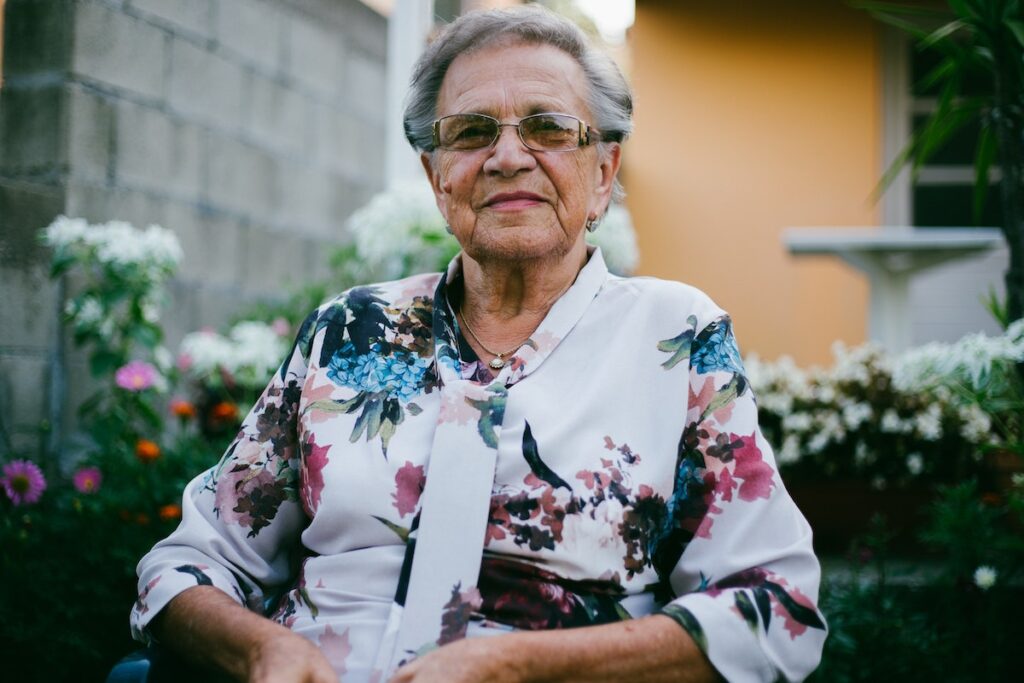
Frail older adults (FOAs) are often neglected in research and treatment for anxiety and depression. Getting older comes with many challenges: bereavement, loneliness, unemployment, illness, and physical frailness; all of which are likely to impact one’s mental health, but many older adults believe mental health issues are a normal part of ageing (Corcoran et al., 2013; Holm & Severinsson, 2014).
Frailty affects around 11% of older adults (Collard et al., 2012) and quadruples the risk of developing depression and anxiety (Ni Mhaolain et al., 2012). While there is no fixed definition, it is recognised as impaired physical abilities, including unintentional weight loss, reduced activity and low energy (Fried et al., 2001). Anxiety not only impacts the quality of life, but it can also increase mortality (Dent & Hoogendijk, 2014). Additionally, depression may also worsen mental functioning and accelerate ageing (Potter et al., 2016).
So why aren’t older adults seeking help? Depression and anxiety are often not detected in FOAs partly due to the prioritisation of physical health (Frost et al., 2019). Additionally, research often excludes adults over 75 years old due to co-occurring illnesses (Benraad et al., 2016). Therefore, the impact of treatment in this population is largely unknown. Despite many FOAs preferring psychological therapy, they are often given medication instead, which is likely due to financial restrictions within the NHS (Gum et al., 2006; Landreville et al., 2001; Mohlman, 2012; Walters et al., 2018).
Frost and colleagues (2019) recognised this gap in research and sought to explore frail older adults’ experiences of anxiety and depression, and what may prevent help-seeking in order to improve services.

Frailty affects around 11% of older adults and quadruples the risk of developing depression and anxiety.
Methods
Five UK GP surgeries selected participants from the GP’s frailty list who were aged 75+ and experiencing anxiety or depression. Those with a diagnosis of dementia or less than 6 months life expectancy were excluded. GPs sent out invites to those without symptoms of anxiety and depression due to under-diagnosis. Selected participants were invited to complete a questionnaire self-diagnosing depression and anxiety. Symptoms and frailty were assessed over the phone.
Semi-structured interviews were conducted in 28 FOAs. Questions covered participant’s physical health, symptoms and likelihood of asking for help. They also included participants’ views of treatments, experiences of mental health, and service improvement suggestions. The topic guide was co-produced with patients and the public and was modified as the interviews progressed. Terminology such as ‘low’ or ‘worried’ was chosen to reduce stigma, before being replaced with participant’s personal terminology.
Data including age, ethnicity and self-diagnosed anxiety or depression were collected. Thematic analysis was used to group participant responses, and then all themes were cross-validated by other researchers in the team and refined.
Results
Interviews were held with 28 participants (75 to 88 years old), from which the researchers drew six themes:
- Expectations of treatment: Poor mental health, particularly anxiety, was assumed to result from ageing (poor physical health, difficult circumstances), making it appear as a ‘normal’ occurrence. Many believed that treatment could not change social circumstances (e.g., family and finance), and this, in combination with poor GP support, lowered treatment expectations.
- Appropriateness of different treatments: Some participants felt their symptoms were not severe enough to seek treatment. Generally, they liked the idea of counselling but perceived cognitive behavioural therapy (CBT) as confusing. Antidepressants were the least appealing treatment and the expectation of them being prescribed further prevented help-seeking.
- Promoting independence: Antidepressants were partly perceived as a threat to independence. FOAs preferred talking therapies as they helped develop problem-solving skills and promote independence. Practical advice for common problems was valued.
- Connection: Having someone who listens and shares their perspective was important. Actual face-to-face contact was particularly preferred over virtual contact.
- Inclusivity of mental health services: The majority of FOAs felt their lack of technological knowledge and skills inhibited them from accessing online health services. Mobility constraints from illness, injury, or financial issues posed challenges to travelling to health service locations.
- Endorsement of treatments: FOAs felt more confident accepting treatment if it was recommended by someone else, like their GP or voluntary organisations.

This research suggests that frail older adults have doubts about the effectiveness and appropriateness of some mental health treatments (e.g. antidepressants), but practical advice and face-to-face therapy is generally welcomed.
Conclusions
Older adults seem to find it particularly difficult to identify and seek support for symptoms of anxiety, while they only believe that the experience of more severe symptoms requires medical support. Likewise, they held low expectations for treatments of mental health which, combined with their perceived lack of knowledge on interventions available, prevented help-seeking behaviours.

This study allowed for a more in-depth understanding of the perception of the support provided for depression and anxiety among the frail older adult population.
Strengths and limitations
The researchers were able to gain a realistic picture of frail older adults’ (FOA) individual experiences of depression and anxiety by taking a constructivist perspective towards data collection and analysis. Previous research has only focused on depression amongst FOAs. Therefore, this study was one of the first to investigate anxiety in FOAs, which may be valuable in promoting further research into the barriers in recognising symptoms of anxiety and seeking support.
The majority of research has been conducted in Western cultures, and likewise, this study only investigated FOAs in the UK. This is problematic as different cultures have differing views of help-seeking, particularly regarding mental health and especially among older adults. The applicability of the study may also be limited by the low response rate observed amongst the more severely frail. The absence of their experiences may be problematic, as the frailest people may be the ones experiencing more severe and frequent depression and anxiety.

The study has been conducted in the UK, so may not be relevant to other countries, as different cultures have differing views of help-seeking, particularly regarding mental health and especially among older adults.
Implications for practice
- Public-level interventions aiming to promote a better understanding of mental health (e.g., symptoms and available treatments) within older adults could be beneficial to helping frail older adults (FAO) and their support network identifying concerns and seeking out treatment.
- Raising awareness in healthcare providers of the internalised mental health stigma FAOs have, and equipping them with a better understanding of how to identify and approach this topic, could ensure individuals are signposted to the most appropriate route of care.
- Research on both the perception and effectiveness of different treatment types and modalities (e.g. CBT vs counselling vs online delivery) for older adults, may help improve treatment expectations.
- Finally, healthcare policies should incorporate mental health screenings into frailty reviews as findings showed that a decline in physical health can be linked to feelings of anxiety and depression.

The mental health of frail older adults has previously been overlooked due to the prevalence of poor physical health, however, it is clear that changes in policy and research are needed to address this.
Statement of interests
None.
Contributors
Thanks to the UCL Mental Health MSc students who wrote this blog from Bisby A Group: Bundies Gabriel (@GBundies), Butterworth Hannah (@h_butterworth); Hamza Leila (@leilahamza_), Haris Aishah (@aishah__haris), Henderson Mariella, Hendy Anne Sophia (@anne_hendy), Lamirel Daphne, Martinez Sosa Candelaria, Short Tamara (@TamaraShort_) and Subati Abulikemu.
UCL MSc in Mental Health Studies
This blog has been written by a group of students on the Clinical Mental Health Sciences MSc at University College London. A full list of blogs by UCL MSc students from can be found here, and you can follow the Mental Health Studies MSc team on Twitter.
We regularly publish blogs written by individual students or groups of students studying at universities that subscribe to the National Elf Service. Contact us if you’d like to find out more about how this could work for your university.
Links
Primary paper
Frost, R., Nair, P., Aw, S., Gould, R. L., Kharicha, K., Buszewicz, M., & Walters, K. (2019). Supporting frail older people with depression and anxiety: A qualitative study. Aging & Mental Health, 24(12), 1977-1984. doi:10.1080/13607863.2019.1647132
Other references
Corcoran, J., Brown, E., Davis, M., Pineda, M., Kadolph, J., & Bell, H. (2013). Depression in older adults: A meta-synthesis. Journal of Gerontological Social Work, 56(6), 509–534. doi:10.1080/01634372.2013.811144
Holm, A. L., & Severinsson, E. (2014). Surviving depressive ill-health: A qualitative systematic review of older persons’ narratives. Nursing & Health Sciences, 16(1), 131–140. doi:10.1111/nhs.12071
Collard, R. M., Boter, H., Schoevers, R. A., & Oude Voshaar, R. C. (2012). Prevalence of frailty in community-dwelling older persons: A systematic review. Journal of the American Geriatrics Society, 60(8), 1487–1492. doi:10.1111/j.1532-5415.2012.04054.x
Ni Mhaolain, A. M., Fan, C. W., Romero-Ortuno, R., Cogan, L., Cunningham, C., Kenny, R. A., & Lawlor, B. (2012). Frailty, depression, and anxiety in later life. International Psychogeriatrics, 24(8), 1265–1274. doi:10.1017/S1041610211002110
Fried, L. P., Tangen, C. M., Walston, J., Newman, A. B., Hirsch, C., Gottdiener, J., … McBurnie, M. A. (2001). Frailty in older adults: Evidence for a phenotype. The Journals of Gerontology Series A: Biological Sciences and Medical Sciences, 56(3), M146–M156. doi:10.1093/gerona/56.3.m146
Dent, E., & Hoogendijk, E. (2014). Psychosocial factors modify the association of frailty with adverse outcomes: A prospective study of hospitalised older people. BMC Geriatrics, 14(1), 108. doi:10.1186/1471-2318-14-108
Potter, G. G., McQuoid, D. R., Whitson, H. E., & Steffens, D. C. (2016). Physical frailty in late-life depression is associated with deficits in speed-dependent executive functions. International Journal of Geriatric Psychiatry, 31(5), 466–474. doi:10.1002/gps.4351
Frost, R., Beattie, A., Bhanu, C., Walters, K., & Ben-Shlomo, Y. (2019). Management of depression and referral of older people to psychological therapies: A systematic review of qualitative studies. British Journal of General Practice, 69(680), e171–e181. doi:10.3399/bjgp19X701297
Benraad, C. E. M., Kamerman-Celie, F., van Munster, B. C., Oude Voshaar, R. C., Spijker, J., & Olde Rikkert, M. G. M. (2016). Geriatric characteristics in randomised controlled trials on antidepressant drugs for older adults: A systematic review. International Journal of Geriatric Psychiatry, 31(9), 990–1003. doi:10.1002/gps.4443
Gum, A. M., Arean, P. A., Hunkeler, E., Tang, L., Katon, W., Hitchcock, P., … Unützer, J. (2006). Depression treatment preferences in older primary care patients. The Gerontologist, 46(1), 14–22. doi:10.1093/geront/46.1.14
Landreville, P., Landry, J., Baillargeon, L., Guerette, A., & Matteau, E. (2001). Older adults’ acceptance of psychological and pharmaco- logical treatments for depression. The Journals of Gerontology: Series B, 56(5), 285–291. doi:10.1093/geronb/56.5.p285
Mohlman, J. (2012). A community based survey of older adults’ preferences for treatment of anxiety. Psychology and Aging, 27(4), 1182–1190. doi:10.1037/a0023126
Walters, K., Falcaro, M., Freemantle, N., King, M., & Ben-Shlomo, Y. (2018). Sociodemographic inequalities in the management of depression in adults aged 55 and over: An analysis of English primary care data. Psychological Medicine, 48(9), 1504–1513. doi:10.1017/S0033291717003014
Photo credits
- Photo by Matthew Bennett on Unsplash
- Photo by Damir Bosnjak on Unsplash

Great review in undervalued area – thanks all for the summary